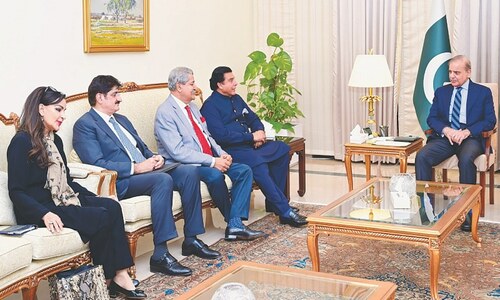KARACHI: Expressing concern over the high prevalence of hepatitis in the country, experts at programmes held in the city to mark World Hepatitis Day on Thursday called for aggressive government campaigns to create public awareness about the disease as well as helping poor patients get the necessary treatment.
The disease, said experts, had taken the form of an epidemic, with Pakistan having the second largest hepatitis C patients, after China.
Speaking at an event organised by the Indus Hospital at a local hotel, spokesperson of the Prime Minister Dr Musadik Malik said hepatitis was a silent killer and could destroy generations in the absence of adequate care and preventive measures.
He urged provincial governments to sign up for the PM healthcare scheme under which poor families could get free treatment at some of the best private hospitals in the country.
“The PM healthcare scheme even supports families who earn less than Rs200 a day and they can acquire treatment at some of the best hospitals in the county. The federal government will pay for the treatment cost,” he told the audience, regretting that the governments of Khyber Pakhtunkhaw and Sindh had not signed the said scheme and thus their populations were deprived of its benefits.
The progamme, initially launched in three districts (Quetta, Islamabad and Muzzafarabad), would be extended to 21 districts, he added.
“The federal government can launch or support a health programme but cannot force a province to take steps for the well-being of its population,” he said.
Dr Zafar Zaidi, representing the Indus Hospital, briefed the audience about the Umeed Hai Zindagi foundation, a public health initiative launched at the programme in collaboration with the pharmaceutical company PharmEvo, which would offer free treatment to hepatitis patients.
“Hepatitis clinics will be established under this programme which we will gradually take up to the national level,” said Dr Zaidi.
At the Sindh Institute of Urology and Transplantation (SIUT), people came in large numbers to avail free treatment and screening facilities for hepatitis.
The institute had arranged day-long activities to educate the public on disease prevention and treatment.
“According to some statistics, about 15 million people in Pakistan (one in 13) are harbouring the virus of hepatitis B or C. The theme for this year as announced by the World Health Organisation was ‘No Hepatitis’ which calls to eradicate the disease globally by 2030,” said an SIUT official.
During the day-long proceedings, videos in local languages were shown to visitors, highlighting the risk factors for hepatitis, its modes of transmission, and how people can prevent it, he said.
Prof Zaigham Abbas, head of the department of gastroenterology at the Ziauddin University & Hospital, held a public awareness session at the heath facility to mark the day.
“Pakistan is second to China in having a large number of hepatitis C patients. There is an utmost need to increase awareness about the risk factors, prevention and treatment of hepatitis,” he said.
He also focused on the barriers to curing hepatitis and the importance of screening and early diagnosis.
“Unhygienic environment, reuse of syringes, injections, drips, needles, unsterilised equipment, poorly screened blood (for transfusion), and improper use of razors by barbers are some major factors responsible for the widespread prevalence of hepatitis B and hepatitis C in Pakistan,” he said.
At a programme held at the National Institute of Liver & GI Disease, Dow University of Health Sciences, speakers said that hepatitis had emerged as a major health challenge and there was a need for national as well as international efforts to check its spread.
“It is important to screen the blood properly and adopt sterilisation measures during dental and surgical procedures. Early diagnosis is crucial as proper treatment at this stage can lead to complete recovery,” said vice chancellor of the university, Prof Masood Hameed Khan.
Prof Rana Qamar Masood, Dr Hafeezullah Shaikh, Dr Manzoor and Dr Abdullah bin Khalid also spoke.
Earlier, a walk led by recipients and donors of liver transplant was held to mark the day.
Published in Dawn, July 29th, 2016










































Dear visitor, the comments section is undergoing an overhaul and will return soon.